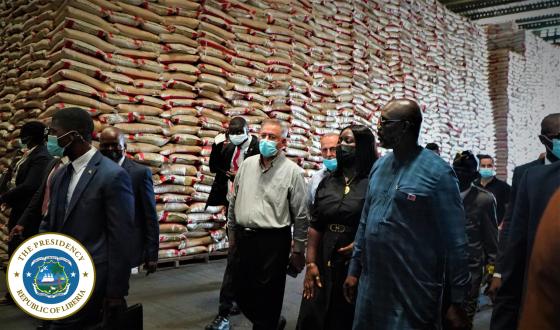Mr. President, Wake Up!

Flashback: In April 2022, President Weah visited the warehouses of rice importers to ascertain rumors of rice shortage
.... It is time for President Weah to know that his administration, nearing its sixth year, has spent more than US$30 million in the last five years to subsidize rice imports rather than investing in agriculture to make the country self-sufficient in food production.
Is President George Manneh Weah not aware that the price of a 25kg bag of rice has nearly tripled? Is he not aware that such an increase has compounded the misery of millions of Liberians who live in vulnerable homes, facing food insecurity?
We ask these questions because the President's only response to the country's ongoing food crisis is a veiled denial that the country’s staple food was not in short supply.
This is contrary to the evidence on hand which shows that the price of a bag of rice has risen from US$13 to $15 to now US$30. It is even more expensive in rural Liberia, threatening the lives of millions, while the country's most vulnerable do not have the luxury of time.
“We need not always listen to the gossip of the streets. This is not the first time it has happened. Those responsible for importing rice say we have rice up to next year. I don’t believe there’s rice scarcity. I believe there is rice,” President Weah said when quizzed by journalists on rice shortage on September 26, upon his arrival from the 77th United Nations General Assembly (UNGA).
What is more shocking is that the President made such a remark, unaware that India’s decision last month to restrict exports of broken rice and put a 20 percent levy on exports of various grades of rice will raise upward pressure on global food prices, Liberia being no exception.
India is the world's biggest exporter of grain, exporting rice to more than 150 countries, including Liberia, which is one of the poorest in the world and heavily dependent on food imports, especially its staple, rice.
Considering the interconnected shocks of the COVID-19 pandemic, climate change, and the Russia and Ukraine War, one would assume that the President was going to think on his feet when quizzed on the issue of rice shortage issues, to inform the Liberian people of a strategy to remedy the public predicament, so it never repeats itself.
This is important since, IN TIMES OF CRISIS, people rely on the leader to ensure swift action, but the President’s denial statement indicates a careless attitude toward the plights of his people, many of whom are suffering from precarious poverty, hunger, and malnutrition.
In Liberia, poverty under the Weah administration remains widespread, with 50.9 percent of the population living below the national poverty line, according to the World Bank Poverty & Equity Brief on Liberia.
About 2.3 million Liberians were unable to meet their basic food and nonfood needs, with poverty being higher in rural areas, home to 71.7 percent of the poor compared to 68 percent of the total population. The share of the population living below the international extreme poverty line (US$2.15 per person per day in 2017 PPP) was 34.6 percent in 2022, exacerbating poverty in many households that are vulnerable to food insecurity, according to the report.
These are not mere statistics, but rather an accurate reflection of the financial circumstances of most Liberians. And with the surge in the price of rice, is the glaring fact that many poor Liberians are being hit hard — struggling to afford the food needed by their families.
Therefore, we call on the President to Wake Up from his sleep to put in place a raft of solutions to shuttle our people through this crisis before its gets out of hand — wiping decades of gains in reducing hunger and poverty, undermining the country’s efforts to achieve its Sustainable Development Goals (SDGs) by 2030, while exacerbating inequalities.
The President must wake up to ensure an urgent government response that would reduce the country’s food insecurity and malnutrition risk, given that Liberia is a country with vast fertile soil for the cultivation of rice and other produce. It is time for President Weah to know that his administration, nearing its sixth year, has spent more than US$30 million in the last five years to subsidize rice imports rather than investing in agriculture to make the country self-sufficient in food production.
This action of the Weah government is counterproductive to the country’s need for food security and must be reversed — given that food insecurity remains a key challenge given the intensification of its drivers, including conflict and extreme economic slowdowns, etc.
So, in challenging circumstances like the current crisis, which is not a strange phenomenon under Weah, we expect the President to take the lead to address the problem of rice shortages.
Mr. President, you need to ensure stabilization of markets, which would lead to accessibility and affordability of food, minimize hoarding and other speculative behavior that would cause another food crisis after this one, the end of which is not clear.
Also, the millions that have been earmarked to subsidize rice in the next budget year should be urgently redirected to support local mechanized farmers as part of a wide range of policy responses to address the country's never-ending vicious cycles of food insecurity, with a focus to strengthen against future global shocks.
Mr. President, NOW IS THE TIME TO ACT. Your silence is not helping the situation. You need to lead your people as well as increase consumption of diverse food varieties; diversify sources of imported foods; and reduce food loss and food waste. Please, do not let the ghost of April 14, 1979 return. You of all people should know that a small increment in the price of rice on April 14, 1979, led to a major riot, dubbed the “Rice Riot”, which led to the destruction of lives and properties.
